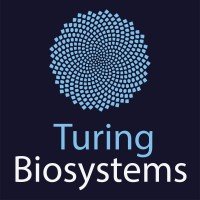Turing Biosystems Ltd.
keyboard_backspaceBack to Home
Contact
4 Rue De La Republique
69001 Lyon
France
CEO
About us
Turing Biosystems is a startup based in London & Lyon built to catalyse the convergence between biology and computing, with a mission to facilitate better therapy design and improving patient outcomes. Our platform integrates and creates associative networks between any and all types of clinical and biological data. This knowledge can be used to design more effective drugs and vaccines, de-risk clinical translation of new therapies, minimise the likelihood of negative patient response to treatments, and ultimately save lives, all while remaining cost-effective.
Our main focus is in immune-related response to therapies, from cell and gene therapy to antibodies to vaccines. We have built advanced capabilities in studying complex interactions between the immune system, microbiome, metabolism, therapies, and clinical outcomes. In an early partnership on liver cancer, we discovered new biomarkers and new potential therapy combinations with immune mechanistic insights to trigger response to immune checkpoint inhibitors for hepatocellular carcinoma. We are currently working with other clinical partners on immunotherapy response optimization in melanoma, lung cancer, and head and neck cancers. In addition, we are running partnerships with a gene therapy biotech to reduce immune adverse events to their product(s), as well as a project on tumour spatial response to immunotherapy and ADCs with a large pharma.
Business offer
Our software platform, inspired by semiconductor design technology, integrates and creates associative networks between any and all types of clinical and biological data. The platform is based on our proprietary reasoning AI and graph engine and provides everything from initial data processing to actionable insights that support clinical translation. AI analysis connects all the data points from your data, public data, knowledge, and real data from our clinical network. These can be fully interrogated by the user and represented as a network of connected clinical and biological entities responsible for a clinical outcome of interest. The platform also outputs recommendations of changes to improve this outcome. Visualised connections between layers of data can be used to predict patient responses to treatments, suggest leads with the greatest chances of success, and ultimately design therapies that work better, more consistently, for a greater number of patients.
We have a range of offerings for clients of any size, from individual clinicians to large pharma R&D departments:
- Software platform & graph engine: flexible pricing per-engine
- Software platform + managed service: monthly or yearly contract
- Collaborative R&D partnerships tailored to the client’s needs
Activities
- Service
- Research Unit
- Cardiology
- Genetic Diseases
- Immunology
- Inflammation
- Other
- Target selection & validation
- Gene / protein discovery
- bioinformatics design
- Expression and pathway analysis of target
- quantification of target
- Assay development in in-vitro & in-vivo models
- Research exploratory companion biomarkers
- Hit discovery
- Screening & Identification
- Therapeutic libraries
- In silico
- In-vivo models
- In-vitro & ex-vivo models
- Indication searching
- Bioinformatics prediction & analysis
- Immunotherapy lead generation
- Functional effects
- ADCC, ADCP & CDC
- Antigen density target
- Internalization
- Pharmacology & Biological activity
- PK/PD bioavailability
- Mode of Action
- Therapeutic efficacy
- Safety
- Immunogenicity
- Hypersensitivity & allergies
- Immunotoxicology
- Specificity
- Immunotherapy lead optimization
- Proof of concept
- Pharmacology potency
- Exploratory toxicology
- in-vitro & ex-vivo models
- in-vivo models
- Preclinical biomarkers
- Mechanism/Function
- Mechanism of action
- Safety
- PK/PD features
- Indication Identification
- Exploratory toxicology
- Drug-Target interaction
- Level of response duration
- Specificity
- Surrogate markers
- Research exploratory Companion biomarkers
- Bioinformatics design
- Bioinformatics prediction & analysis
- Animal biomarkers
- Human biomarkers
- Predictive biomarkers
- Treatment efficacy
- Population stratification
- Risk/benefit profile
- Disease progression / follow-up
- Clinical trials
- Phase I
- Phase II
- Phase III
- Clinical biomarkers
- Predictive biomarkers
- Treatment efficacy
- Population stratification
- Risk/benefit profile
- Disease progression / follow-up
- Safety
- PK/PD features
- Surrogate markers
- Disease progression monitoring
- Companion biomarkers
- Treatment efficacy
- Treatment monitoring
- Toxicity
- Cell modification
- Direct reprogramming
- Cell Activation
- Target Identification
- Gene / protein discovery
- bioinformatics design
- Expression and pathway analysis of target
- quantification of target
- Research exploratory companion biomarkers
- Gene Delivery System
- Adeno-Associated Virus (AAV)
- Biomarker Identification
- Research exploratory Companion biomarkers
- Bioinformatics design
- Bioinformatics prediction & analysis



